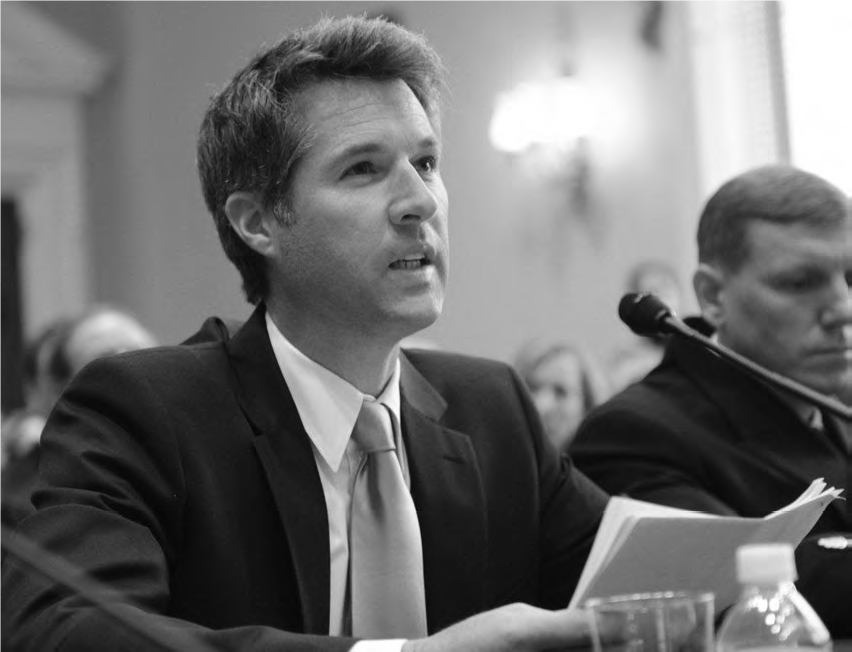In real life, fairy tales don’t always have happy endings. Young and dashing David Goldman was a model in Milan when he met and married a lovely Brazilian 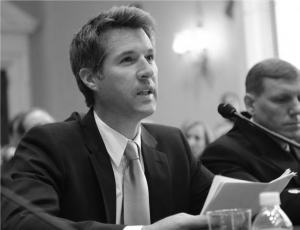 woman named Bruna Bianchi. Life was good in their Tinton Falls home, especially after the arrival of Sean in 2000. Everything changed four years later, however, after Bruna took Sean on what was supposed to be a brief family visit to Rio di Janeiro. She ended their marriage with a phone call and refused to return, triggering years of agonizing custody litigation in a foreign land. Though her marriage to David was never legally dissolved in the U.S., Bruna married João Paulo Lins e Silva, scion of a powerful family that had provided legal advice to the country’s elite since the 1800s. Bruna and João produced a baby girl (Sean’s halfsister), but Bruna died from childbirth complications. The legal battle only intensified when the family sought to keep Sean in Brazil. In his book A Father’s Love: One Man’s Unrelenting Battle to Bring His Abducted Son Home, David delivers a heart-pounding blow-by-blow of his remarkable battle to win Sean back. EDGE Editor Christine Gibbs welcomed David Goldman into her home this summer, and rediscovered the very human side of a drama that had been played out in newspaper headlines and cable news reports for more than a half-decade.
woman named Bruna Bianchi. Life was good in their Tinton Falls home, especially after the arrival of Sean in 2000. Everything changed four years later, however, after Bruna took Sean on what was supposed to be a brief family visit to Rio di Janeiro. She ended their marriage with a phone call and refused to return, triggering years of agonizing custody litigation in a foreign land. Though her marriage to David was never legally dissolved in the U.S., Bruna married João Paulo Lins e Silva, scion of a powerful family that had provided legal advice to the country’s elite since the 1800s. Bruna and João produced a baby girl (Sean’s halfsister), but Bruna died from childbirth complications. The legal battle only intensified when the family sought to keep Sean in Brazil. In his book A Father’s Love: One Man’s Unrelenting Battle to Bring His Abducted Son Home, David delivers a heart-pounding blow-by-blow of his remarkable battle to win Sean back. EDGE Editor Christine Gibbs welcomed David Goldman into her home this summer, and rediscovered the very human side of a drama that had been played out in newspaper headlines and cable news reports for more than a half-decade.
EDGE: Describe Father’s Day seven years ago.
DG: On Father’s Day 2004, I had just learned that Sean had been abducted by his own mother, my wife, Bruna. Actually, I don’t even want to remember it as Father’s Day that year. That was the first of many holidays that came and went while he was away. I treated each one as if it was just another day. I tried to keep busy and to keep going.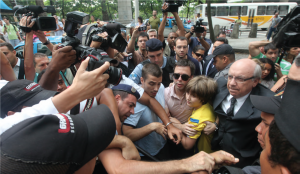
EDGE: Was there a moment when you thought that you might never see your son again?
DG: I never had that moment, and that’s what kept me going. I always believed that we would be together again. However bleak that hope was at times, I never stopped hoping and believing in something that was so true and so right that it would have to happen. It had to happen. I would not give up until it happened.
EDGE: Did the fact that Sean was with his mother and her family give you any comfort?
DG: Well, yes. I knew where he was. I knew that they would take care of him better than if he had been abducted by strangers. Yes, absolutely. But he was mostly with his grandmother, not his mother. In fact his grandmother recently admitted that Sean had lived the whole time with her and not his Mom. I’m still trying to piece things together. It seems that, to some degree, it was Bruna’s mother who was obsessed with our son, and with Bruna’s returning to Brazil. And Bruna could not go back home without her son; what would people think? It was always about image. I wouldn’t say it was exactly “comforting,” but at least I knew that Sean wasn’t someplace that I might never find him.
EDGE: Eventually, you had to deal with Sean’s stepfather— and his wealthy and influential family.
DG: That’s where it became even more concerning. Bruna and I were never even separated in this country—let alone divorced—so I will never consider him as a “stepfather.” This man is a second abductor in my opinion. That family had a sense of entitlement and narcissism that made them feel they were a powerful Goliath in Brazil. So how dare some Gringo, an American fisherman from New Jersey, take them on and drag them through such a mess by fighting against them! Even when I realized how powerful the family was, it didn’t shake me. I don’t know why. Wait, I guess I do know why. I always believed that the rule of law—the rule of God’s law and man’s law—was on our side. I just had to keep standing in the light of truth.
EDGE: It’s almost a cliché that Americans can’t get a square deal when they are fighting in an overseas courtroom. What were some of the frustrations you experienced in your legal battles in Brazil?
DG: According to the terms of the Hague Convention Treaty, an abducted child must be returned within six weeks in order to disrupt the child’s life as little as possible. I immediately approached the Brazilian Central Authority about this, but they refused to file under the Hague Treaty in order to help me as the left-behind parent. After several weeks of no action, I felt forced to hire a Brazilian lawyer, at which time the BCA said that the matter was now out of their hands. Basically the BCA was complicit in the kidnapping.
EDGE: And possibly there was gender bias.
DG: Yes, there was one judge—who wore rock-star sunglasses in court—who stated that she had just lost her own mother and, although she didn’t know the facts of my case, that “the child always belonged with the mother.” She admitted beforehand that that would be her decision and she would back into it somehow. It was ludicrous and offensive. People were even serving coffee to the lawyers and judge right in the courtroom. The lack of decorum throughout my many hearings in Brazilian courts was astounding and so was the attitude and the decisions of some of the judges.
EDGE: Who turned out to be the biggest help to you here in the U.S.?
DG: There were so many people, like my long-time friends Mark DeAngelis and Bob D’Amico, whose support was invaluable. Obviously New Jersey Congressman Chris Smith was just incredible. He went right into battle with me by getting on a plane and flying with me to Brazil. Both of my attorneys dotted every i and crossed every t. They couldn’t control the judges, but they did use the law to our benefit. They closed every door they could and nailed each shut because we were up against some very slick opposition who would slither under any door if they could. Obviously, Senator Frank Lautenberg and Secretary of State Hillary Clinton—just coming on TV and speaking about my case— that was unbelievable. Help came from as high up as President Obama. The people from Dateline on NBC and our local New Jersey media pitched in. I couldn’t possibly pick one as being greater than the others. Every bit of help was important. Remember, we eventually got Sean out of there, but only barely by the skin of our teeth.
EDGE: At what point in this almost six-year process did you sense that things might be breaking back your way?
DG: As unfortunate as Bruna’s tragic passing in childbirth was, it gave us—Sean and me—a second chance at life together. It was at that point that not only was Brazil breaking its own law, but also American law and international law. They would have had to change their own constitution regarding custodial rights, since Brazilian law clearly stated that custody was to go to the fit and surviving parent. Once they started breaking their own laws, well, that was when I really and truly believed we could win.
EDGE: Have all the loose ends been tied up, or are there still unresolved issues that require your attention?
DG: Unfortunately they’re not all resolved. The family is still appealing to overturn the decision that returned Sean home to America. They want to have him returned to Brazil, especially his Grandmother. Bruna’s Brazilian “husband” has even sued me on behalf of Sean’s half-sister Chiara. They’ve opened up lawsuits in both countries. Although Sean’s Brazilian grandparents have claimed all they ever wanted was to be allowed to visit, what they were really after was shared custody. They continued to refuse to acknowledge that this was Sean’s home and that, as his Dad, they should support me. While with them in Brazil, he wasn’t even allowed to call me Dad or to hug me when they finally let him see me. Fortunately, Brazil has now made parental alienation a crime. Ironically, Bruna’s Brazilian “father-in-law” was actually lecturing on how a child can be turned into an attack missile against the left-behind parent—even while that family was guilty of doing exactly that!
EDGE: How would you assess the performance of your legal team, the Brazilian media and the Brazilian public?
DG: I’d have to give both my lawyers outstanding grades for their due diligence, their knowledge of the law, and their teamwork. Patricia Apy, my American counsel, is brilliant in this field. Her legal expertise and determination to advocate for her client is amazing. And Ricardo Zamariol, at the age of 23 or 24, faced off with some powerful opponents in Brazil. The Brazilian media were very, very biased. They tried to make it into a nationalism issue by supporting the kidnappers. Much of the truth finally did come out, but it was amazing how distorted the reporting was. Apparently, the families had some close connections with some of the big media networks. The Brazilian public, in the beginning, was inundated with slander and lies, but once the truth started getting through, the public identified with me as victim even though I was an American. Many of them had been personally victimized by the privileged and powerful in high society. They finally realized that I was one of them. They recognized the miscarriage of justice when they finally could see it. They knew how wrong it was to separate a parent from his child, especially when I was the only surviving parent.
EDGE: What do you hope Sean comes away with out of all of this?
DG: I hope, first of all, that he can grow up in a normal and loving environment as any parent would—that he hasn’t been too scarred by underlying issues. He’s been through way too much already. Losing his Mom had to be tremendously painful, especially at age 7. I want my child to grow up to be thoughtful, caring, considerate, enlightened…but all in good time. Right now my focus is for Sean to be an 11-year-old boy doing ordinary things—going to camp, playing ball, joining a swim team, going to the Sandy Hook beach. I want to instill in Sean good values— honesty, humility, gratefulness, and sincerity. The exact opposite of the values he was taught while in Brazil.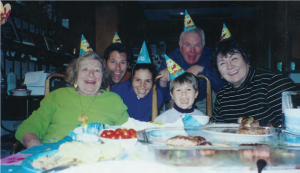
EDGE: What lessons will you carry with you going forward?
DG: To never give up hope, especially when you know that what you’re doing is so right. You have to keep going. You have to keep carrying that torch of hope forward. In all cases like mine, the suffering is not on the part of the parent alone. It’s shared by everyone who is close to the abducted child. So I want to continue to carry that torch—through our Bring Sean Home Foundation—to make change for the better really happen for others like Sean and me.
EDGE: What has been the easiest part of the transition back to life with Sean?
DG: Just doing routine, mundane things together at home, like sitting down and watching TV or playing a video game, playing catch, doing homework.
EDGE: What have you found to be the most challenging?
DG: Some of the most challenging part comes from certain learned behavioral traits that Sean picked up while he was in Brazil, such as avoiding accepting responsibility. Most kids will make some excuses at one time or another, but Sean sometimes takes it to a level well beyond his years. It’s just too mature. So I spend a lot of time trying to determine what is normal for an 11-year-old and, what is a byproduct of Sean’s special situation—which included a good deal of brainwashing. The picture they painted of me, of New Jersey, of America, was obviously not true. When he came home, he saw reality—so much love, so much patience, so much understanding from me, from his grandparents, from the community. Having been told horrible lies for five long years, the reality was shocking.
EDGE: In your book you also talk about the challenge of setting parameters. How does that apply to Sean?
DG: Sean had lived an adult lifestyle with his grandparents— staying up late, getting up late, going out socially with adults, and so on. I have been working on getting him back to being a child again.
EDGE: And how is that going?
DG: Once Sean opened that curtain to his childhood, he just wanted to go right back to being a kid again. He’s learning to let go of the adult behavior and mannerisms. He wants to be a kid as much as I want to be his Dad.
EDGE: How did you celebrate this past Father‘s Day?
DG: We went out on our boat along with Sean’s Pop-Pop, who has said to me that not only did he get his grandson back, but he got his son back, too. Now that Sean is back, every day is Father’s Day for me.
Editor’s Note: David Goldman has testified before Congress and is continuing his effort to eliminate child abduction injustices around the globe. For anyone 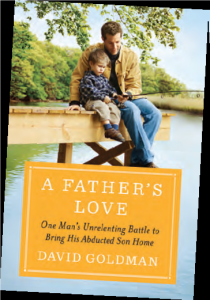 facing the ordeal of an abducted child, bringseanhome.org offers support, advocacy options, and a summary of ongoing legal activity in this field. A Father’s Love: One Man’s Unrelenting Battle to Bring His Abducted Son Home (Viking $26.95) was released this past spring.
facing the ordeal of an abducted child, bringseanhome.org offers support, advocacy options, and a summary of ongoing legal activity in this field. A Father’s Love: One Man’s Unrelenting Battle to Bring His Abducted Son Home (Viking $26.95) was released this past spring.

